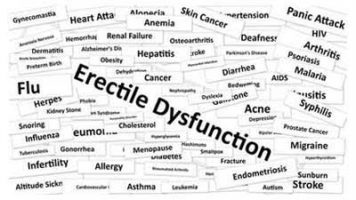- Home
- Editorial
- News
- Practice Guidelines
- Anesthesiology Guidelines
- Cancer Guidelines
- Cardiac Sciences Guidelines
- Critical Care Guidelines
- Dentistry Guidelines
- Dermatology Guidelines
- Diabetes and Endo Guidelines
- Diagnostics Guidelines
- ENT Guidelines
- Featured Practice Guidelines
- Gastroenterology Guidelines
- Geriatrics Guidelines
- Medicine Guidelines
- Nephrology Guidelines
- Neurosciences Guidelines
- Obs and Gynae Guidelines
- Ophthalmology Guidelines
- Orthopaedics Guidelines
- Paediatrics Guidelines
- Psychiatry Guidelines
- Pulmonology Guidelines
- Radiology Guidelines
- Surgery Guidelines
- Urology Guidelines
Diabetes a cause of impotence, reveals a large study

In a large scale genomic analysis conducted by researchers of University of Exeter and the University of Oxford,it has been found that type 2 diabetes is a cause of impotence or erectile dysfunction.The study has appeared in the American Journal of Human Genetics.
Erectile dysfunction, also known as impotence, is when a man is unable to get or maintain an erection.It is more common in the over-40s but affects men of all ages.Failure to stay erect is usually due to tiredness, stress, anxiety or alcohol, and is not a cause for concern.However, it can be a sign of an underlying medical condition such as high blood pressure or cholesterol, side effects of medication, or hormonal issues.
The researchers looked at data on more than 220,000 men across three cohorts, 6,000 of whom experienced erectile dysfunction. The research echoed recent findings that erectile dysfunction has a genetic cause, and goes further by opening the possibility that living a healthier lifestyle may help reduce risk.
The study was conducted by using cutting-edge genetic analysis and the researchers were able to delve deeper than ever before into the complex correlations between diabetes and aspects including body weight. They found that having a genetic predisposition to type 2 diabetes was linked with erectile dysfunction, providing evidence that diabetes can be a cause of erectile issues.But they stressed that just because some people are genetically predisposed to get diabetes, it does not mean that this is their inevitable fate.If men improve their lifestyle - by exercising more and eating better - they can avoid diabetes and also have a functioning sex life.
Professor Michael Holmes, at the University of Oxford, one of the study's lead authors, said: "Our finding is important as diabetes is preventable and indeed one can now achieve 'remission' from diabetes with weight loss, as illustrated in recent clinical trials. This goes beyond finding a genetic link to erectile dysfunction to a message that is of widespread relevance to the general public, especially considering the burgeoning prevalence of diabetes."
Very few clinical trials of diabetes have reported erectile dysfunction as an outcome of improved glucose control. This limits the conclusions that can be drawn about whether treatment of diabetes is likely to have an impact on erectile dysfunction risk.
Dr. Anna Murray, of the , is co-lead author on the study. She said: "Erectile dysfunction affects at least one in five men over 60, yet up until now little has been known about its cause. Our paper echoes recent findings that the cause can be genetic, and it goes further. We found that a genetic predisposition to type 2 diabetes is linked to erectile dysfunction. That may mean that if people can reduce their risk of diabetes through healthier lifestyles, they may also avoid developing erectile dysfunction."
Dr. Jonas Bovijn is the co-first author of the study and is from the Big Data Institute at the University of Oxford. He said: "We know that there is observational evidence linking erectile dysfunction and type 2 diabetes, but until now there has not been definitive evidence to show that predisposition to type 2 diabetes causes erectile dysfunction."
The researchers felt that further research is needed to explore the extent to which drugs used in the treatment of type two diabetes might be repurposed for the treatment of erectile dysfunction.

Disclaimer: This site is primarily intended for healthcare professionals. Any content/information on this website does not replace the advice of medical and/or health professionals and should not be construed as medical/diagnostic advice/endorsement or prescription. Use of this site is subject to our terms of use, privacy policy, advertisement policy. © 2020 Minerva Medical Treatment Pvt Ltd